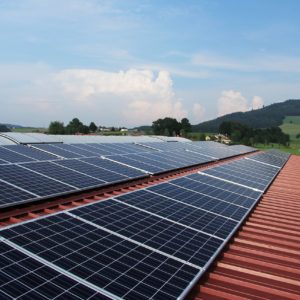Electric and hybrid vehicles have become more common, so why should making your home energy efficient be any different? After all, houses and buildings account for about ⅓ of carbon emissions.
There are many ways to make your home more energy efficient, but residential solar panels are certainly the most well known and obvious option for going green. They are typically installed on the roof of your house, office or even on the open ground in order to collect sunlight and convert it into usable electricity. This variety of solar panels are known as photovoltaic panels, and are probably the most widely known type of solar energy product. Solar panels to heat water are also a fairly common use of photovoltaic panels.
In case you’ve always wanted to try solar but weren’t sure where to start, here are some pros and cons to adding solar panels to your property.

Pro:
- For home buyers and real estate professionals alike, solar panels represent a significant add-on for your home. Their status as a valuable cost saving measure makes them especially noteworthy for potential buyers.
- Most Canadian provinces and American states have programs which give incentives for the use of renewable products and specifically,solar power. Check here to see if your province has incentives that you might be interested in.
- You are helping to reduce carbon emissions and promoting a green technology.
- Solar technology improves by about 10% per year, which means that more effective and lower cost panels are likely to be available over the coming years.
- Solar panels can be used in remote locations such as camps or cottages, where it may be difficult to run a powerline.
Con:
- The catch with solar residential solar panels are that the amount of savings you get from them depends on the amount of sunlight your region receives. Someone in Arizona would likely save much more in energy cost compared to someone in Newfoundland.
- Not everyone is an ideal candidate. In most cases, you are recommended to have a south facing roof in order to capitalize on the sun’s energy. Otherwise, your panels will not be collecting sunlight for as long as they could.
- It isn’t cheap (although you probably didn’t expect it to be). Installing solar panels for an average sized home can cost anywhere from $30,000-$40,000.
- Given the cost, solar panels are a long term investment. Depending on the conditions, it can take between 8-12 years to break even (without government incentives). So you’ll want to be confident you’ll be in your home at least that long to see return on investment.
Even though there are still some major hurdles to the effectiveness and cost of solar energy, it is still a great renewable option for many people. Once you recoup your investment, the cost savings can be in the thousands per year. The good news is that solar energy technology is only getting better. Year by year, the technology is becoming cheaper and more effective. With many companies such as Solar City emerging to provide solar energy services to a mass audience, we could see a major change for the better in the way we power our homes and offices in the not so distant future.
Have a story idea, comment or want to be a contributor? Connect with us at welcomemat@propertyguys.com today!
Author:
 Chris Steeves
Chris Steeves
Chris is an editor and writer for Welcome Mat. He is based out of Moncton, New Brunswick, Canada.










